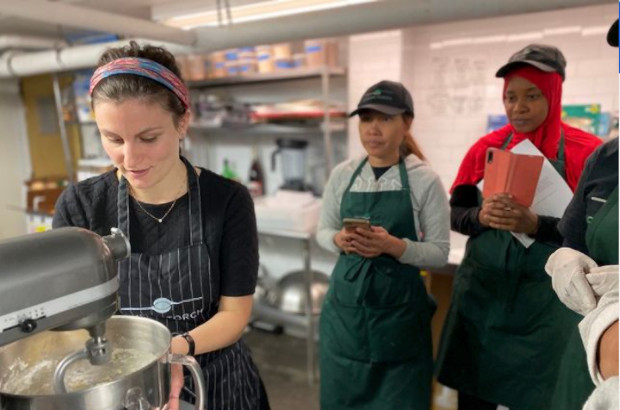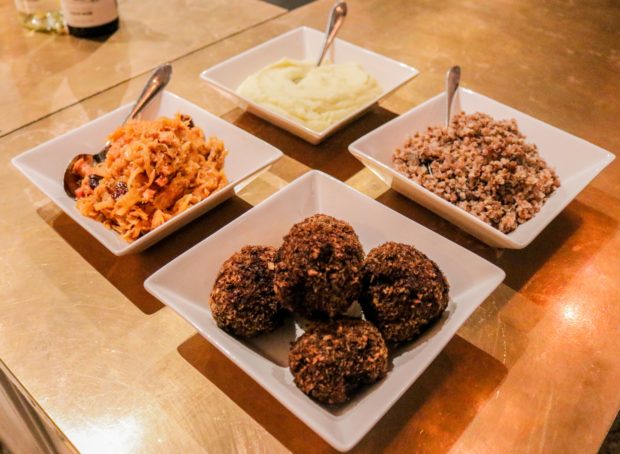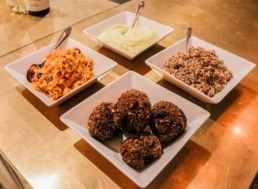Emma’s Torch: Religion and Food
Emma’s Torch: Religion and Food
Kathleen Shriver

Some of the best views of New York’s Statue of Liberty are from a waterside park in Brooklyn’s Red Hook neighborhood. From there, visitors can see the broken shackles at Lady Liberty’s feet, the golden fire raging from her copper torch, and the words to “The New Colossus,” the sonnet at her pedestal.
Just a few blocks from New York’s Statue of Liberty, a nonprofit restaurant and school labors to keep the spirit of Lady Liberty alive. It is known as Emma’s Torch, a tribute to Emma Lazarus, the Jewish American poet whose verse -- “Give me your tired, your poor, your huddled masses yearning to breathe” – decorates Liberty’s pedestal. Founded by Kerry Brodie, Emma’s Torch aims to empower refugees, asylum seekers, and survivors of human trafficking through culinary education.
When launching the nonprofit, 27 year old Brodie, thought back to her highschool -- Charles E. Smith Jewish Day School -- where she learned about Jewish leaders. She says Lazarus was one of the “unsung female heroes of Jewish history” whose work always stuck with her.
“I felt like Emma never got to see what her poem would become,” Brodie said. “ So my hope is that Emma's Torch will also be able to create that sort of lasting legacy and those ripple effects of change as well.”
In the Jewish tradition, when speaking of a righteous deceased person, many will say Z"l (pronounced zal), which is an abbreviation for Zikronam L'bracha. This literally means “may their memory be for a blessing.” “I think this definitely applies to how we are trying to honor Emma's legacy and memory. We are working in her memory,” Brodie says.
While for many restaurants, reopening after the pandemic means staffing up, adding tables, expanding menus, opening the doors earlier and closing them later, for Brodie, it means reprioritizing. It means reconsidering the purpose of Emma’s Torch and drawing from her past and, as it turns out, her faith.
Since its founding in 2017, Emma’s Torch has become a beacon of hope for hundreds. The nonprofit offers a full-time paid training program, during which students receive instruction, mentorship, and work experience, while also developing English conversation skills and other “soft skills” such as resume development and computer literacy.
In 2020, Brodie was looking forward to formalizing and publishing her curriculum and opening new locations around the country.
“2020 was supposed to be the year of stability,” she said. Instead, she got a global pandemic, an economic crisis, and a racial reckoning.
While the pandemic threatened the lives and livelihoods of everyone, the toll it took on those working in the restaurant industry was especially dire. To make matters even worse, Emma’s Torch doubled as a training program for immigrant communities, some of the country’s most vulnerable. Even so, Brodie had faith.
Brodie’s Jewish faith has gotten her family through a profoundly difficult past. “My great grandparents are among the only people from their families, to survive the Holocaust,” she said.
She recalled that several years ago she joined her grandfather on a trip to Lithuania, where many members of his family were murdered by the Nazis. “Standing there was just such an eye-opening experience of what happens when we don't remember that our neighbors are not that different to us, and that's just always stuck with me,” she said.
Ever since this experience, Brodie has been particularly motivated by the Jewish practice of welcoming the stranger. A commandment that is repeated 36 times in the Torah, the scripture reminds Jews that they once “were strangers in the land of Egypt” (Leviticus 19:33-34). “We hope to live up to this commandment and imperative in our work.” At the same time, Brodie doesn’t see these values as exclusive to Judaism.
She loves learning from her students how these same values can come from different life experiences, including other religious traditions.
“At Emma’s Torch, a lot of times either our students come from very strong backgrounds of faith, or are supported and have found friends through their religious community, whether that be a church or a synagogue or mosque,” she said. “Faith in general can be such a powerful tool to bring people together.”
These universal values of unity and welcome have motivated every step of Brodie’s career. After graduating from Princeton University with a degree in Near and Middle Eastern Studies, Brodie hoped to effect change through public policy.
Following two years of policy work at the Israeli Embassy in Washington DC, she became the press secretary for the Human Rights Campaign, a nongovernmental agency based in Washington D.C., where she publicized the organization’s international work. At the same time, she spent her free time meeting with women who inspired her next endeavor.
“I started volunteering at a homeless shelter and was really struck by the conversations about food that I would have with the women at the shelter,” she said.
Brodie wanted to cook with the women. She grew up learning to cook different dishes that connected her to her family’s religious and cultural history and inspired her pride in that history. She wanted to find a way to use food to do more than just feed these women. She wanted food to empower them, too.
“Recipes are not simply a list of ingredients. Each is wrapped in memories,” she said. “Cooking simultaneously defines and transcends our communities.”

Growing up, Brodie would visit her grandparents in South Africa, where they had found refuge during World War II. Both of Brodie’s parents were raised in South Africa and her grandparents still live there today. And during her earliest visits to her grandparents, Brodie learned to cook.
“My grandmother makes the most incredible milchika which are basically South African cinnamon buns. One of my earliest cooking memories is helping her make these.” While many American Jews have foods like bagels-and-lox to break their fasts on the Jewish High Holidays, South African Jews break their fast with milchika–a kind of cinnamon bun. Dishes like milkchika and the religious traditions around sharing them with family and friends has always inspired Brodie to see food as a powerful element in strengthening her faith and in enforcing a shared sense of identity amongst her community of faith.
For this reason, she encourages her students to embrace and celebrate their origins and home countries when they cook.
“Food helps our students understand that they’re not victims and that their work is valuable,” she says. Brodie says that she wants her students to see that each of their unique understandings of flavor and culture can actually enhance our communities and inspire our kitchens.
Inspired by her love of food and her conversations with the women at the homeless shelter, Brodie started reading about the restaurant industry. She read about widening labor gaps and about restaurants struggling to find talent to build out their kitchens.In May of 2016, Brodie left the HRC and began studying at the Institute of Culinary Education.
When she wasn’t learning to cook, Brodie was working to build out the organization of her dreams: a restaurant that would provide opportunities for the most vulnerable, a restaurant that would tell stories through its food.
She wanted to provide jobs for those who were left out. She wanted to bring people of different backgrounds and life experiences together in a space that felt comfortable to all of them; in a space where they could connect and realize that they could, in fact, work together. That space was the kitchen. And after graduating from culinary school in June of 2017, Brodie launched her first pilot program at Emma’s Torch.
Emma’s Torch began offering a free 12-week apprenticeship program with up to 500 hours of culinary and professional training. What’s more, students were paid to participate, allowing them to train full-time and cover expenses.
By the end of 2019, over 100 students had graduated from the program with professional culinary skills, English proficiency, and a community of support. Ninety-seven percent of the graduates had been placed in culinary jobs around the city.
And then, the pandemic hit. Like most people working in the hospitality industry in New York, many alumni were laid off or furloughed and Brodie was forced to close her training program and restaurant. She closed the doors of her restaurant and sent her students and staff home. But Brodie didn’t give up.
She turned her faith into action. The organization remained stable due to support from donors and a Paycheck Protection Program loan. Meanwhile, the Emma’s Torch staff began volunteering to work with students and alumni online. They hosted online cooking classes while also helping students and alumni apply for unemployment benefits. And Brodie innovated, working with old and new partners on her “Culinary Council” to restructure the business in response to the shifting industry.
After six months of solely online programming, Emma’s Torch reopened in October of 2020 with a three track program including the original culinary program in addition to two new tracks for alumni: the first being a community building program and the second a management-level leadership development fellowship for select program graduates.
Ruslan Abdraimov, a graduate of Emma’s Torch, participated in the fellowship. Abdraimov arrived in New York from Russia in 2016 with just $216 in his pocket and no understanding of the English language. Fleeing cultural and political persecution, he left everyone and everything he knew behind – for a chance to start over in America.

He knew one person in New York, who loaned him his sofa and told him about Emma’s Torch. Abdrainmov applied to the pilot program in 2017 and became a student in the first graduating cohort at Emma’s Torch.
Abdraimov remembers making 12 dishes on his graduation night. “I can’t choose a favorite,” he laughs. “It’s like asking [me] to pick [a] favorite child.”
But four of the dishes made him especially proud – a combination he calls “Winter’s Heat.” The roasted buckwheat katah, celery potato mash, sauerkraut stir fried with German sausage, and deep fried mushroom stuffed meatballs use all the vegetables available during winters in Russia. “Winters in a large part of Russia are long and cold. And you have to eat a lot to keep yourself warm,” he says with a smile.
Abdraimov describes his experience at Emma’s Torch as more than just an education in the culinary arts.“You know, it’s one thing when you hear about different countries and religions, but the other thing is, when you actually have a chance to meet that person and spend some time in a kitchen with that person, you know, and be around them every day, like for eight to 10 hours a day,” he said, nodding his head. “You learn a lot. And behind all that history, it’s something universal -- things like kindness, friendship.”
As Brodie shifts her focus to the students and alumni, the flames of Lady Liberty’s fire continue to burn at Emma’s Torch, which has transformed into a take-out cafe. As it was before the pandemic, the menu remains “New American cuisine,” cooked by New Americans.

